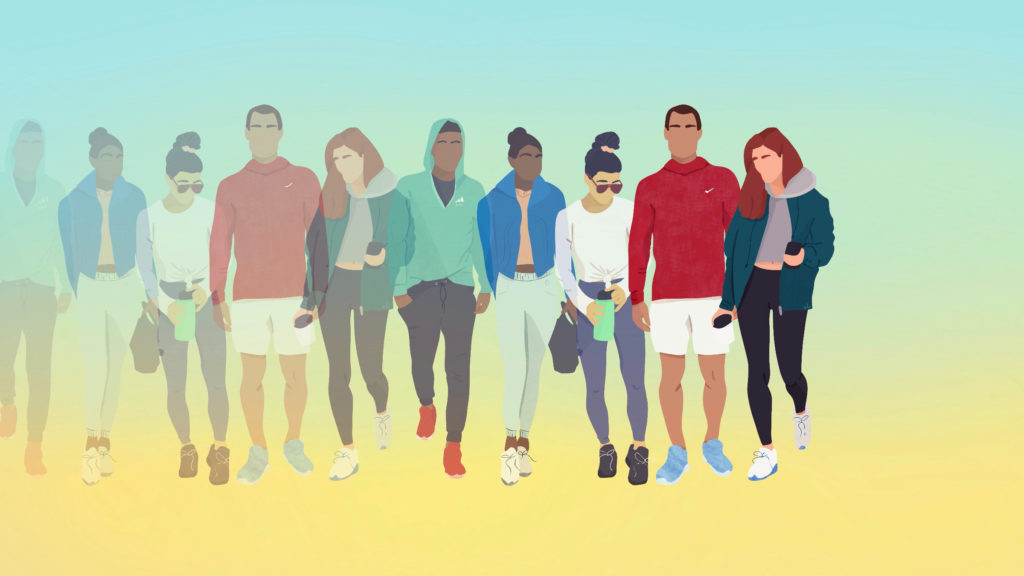Today, we’re exploring all things activewear — including industry leaders, fast-growing upstarts, and the post-pandemic outlook.
A Whirlwind Year
Retailers have been hard hit by the pandemic, but activewear brands fared better than most.
- In 2020, athleisure sales were down 9% YoY compared to a 22% decline for overall apparel sales.
- One out of every $3 spent on apparel in 2020 went to activewear, according to The NPD Group.
Among the winners, data-driven decision making, direct-to-consumer (DTC) sales, and fitness-focused endeavors paid dividends.
Key trends signal the staying power of and upside in activewear.
Whether work is fully remote or an office hybrid, the post-pandemic dress code will be lax as we transition between real life, Zoom meetings, and workouts.
- During the 12 months ending Sep ’20, only 25% of US activewear purchases were made for the intended use of exercise.
From home fitness and wearables to meditation apps and immune support, COVID drove interest in healthy living. Now, the continued rise of the wellness consumer will bolster the category.
- The US athleisure market could top $257B by 2026.
- The global activewear market is expected to reach $547B by 2024.
Nike’s Digital Transformation
Focused on owning the customer experience, Nike is redefining itself.
- Between 2011 and 2020, DTC sales grew from 16% to 35%.
- By 2022, Nike aims to become a 50% digital business.
Executing its One Nike Marketplace strategy, the company is shuttering wholesale accounts, opening Nike Live stores, and going all-in on its arsenal of apps. According to Nike CEO John Donahoe:
“We know a consumer who connects with us on two or more platforms has a lifetime value that’s four times higher than those who don’t.”
As apparel and fitness intersect, Nike’s Training Club and Run Club apps put it at odds with both lululemon and Peloton.
- In April ’20, Training Club members logged 20M workouts, up from 1.8M in ’16.
- Over Summer ’20, 50% of Nike’s global members completed a Run/Training Club workout.
Lulu Stays the Course
In a year unlike any other, lululemon largely stayed the course. As CEO Calvin McDonald put it, “2020 has reset our expectations for what is possible.”
- E-commerce sales doubled from ’18 levels, well ahead of a ’23 target.
- The brand acquired MIRROR, benefitting omnichannel/community efforts.
- The retailer recently announced a sustainability-focused trade-in program.
- In 2022, the company is set to launch its long-awaited footwear line.
On pace to become a global brand, in 2020, net revenue increased 8% in North America and increased 31% internationally. As McDonald sees it: “We are in the very early days of our journey outside of North America.”
What’s Trending
adidas. By 2025, adidas expects 50% of its revenue to come from e-commerce sales. To get there, they’ll invest $1.2B into digital transformation.
The retailer also hopes to increase digital members from 150M to 500M while prioritizing sustainability efforts, making nine out of 10 products more sustainable by 2025.
Boosting the brand, its partnership with Peloton could unlock new customers in the fitness category.
Athleta. In 2008, Gap acquired Athleta for $150M. Last year, the activewear company topped $1B in sales. By 2023, Gap expects Athleta to be a $2B brand.
Promoting inclusivity, Athleta added extended sizing. Expanding beyond the US, the retailer is opening stores in Canada. Raising its profile, the company partnered with champion gymnast Simone Biles who, like track star Allyson Felix, left Nike for Athleta.
If or how they engage their community around fitness offerings or lifestyle content is a massive opportunity but TBD for now.
Outdoor Voices. A buzzy startup that “imploded,” Outdoor Voices is plotting a comeback.
Last year, founder Tyler Haney stepped down as CEO. Internal conflicts and mounting losses saw the retailer’s valuation trimmed from $110M to $40M. In hindsight, Haney said she wouldn’t have raised as much capital: “It enabled bad business practices and bad decisions.”
Engineering a turnaround, Lunya co-founder/CEO Ashley Merrill invested in Outdoor Voices, steered the company to profitability in June 2020, and installed a new CEO.
Alo Yoga. From clothing to digital workouts and skincare, Alo is a multi-faceted brand earning some $200M in annual revenue.
In 2017, Alo made a play for digital content, acquiring yoga app Cody to create its Alo Moves subscription. According to co-CEO Danny Harris, 90% of the company’s revenue is digital, either through e-commerce or its fitness platform.
As retail reopens, Alo will roll out new stores, including experiential concepts with restaurants and yoga studios.
Quick Hits
Gymshark earned a $300M investment from General Atlantic, valuing the previously bootstrapped brand at more than $1.45B. Next up? Creating “a truly global brand.”
Under Armour’s decade of growth ended in 2017. Now, amid restructuring—like selling off MyFitnessPal and shifting to DTC—the tide may be turning.
Fabletics surpassed $500M in revenue, launched a fitness app, partnered with Kevin Hart and Hydrow, and plans to open 24 new stores this year.
NOBULL cashed in with a recent investment valuing the company north of $500M. A favorite among CrossFitters, the brand replaced Reebok as the CrossFit Games’ title sponsor.
Target. In its first year, Target’s activewear label, All In Motion, generated $1B in sales, with the company crediting its focus on inclusivity and sustainability.
Looking Ahead
In an increasingly crowded category, omnichannel efforts, experiential formats, and sustainability initiatives will be top of mind. Of course, as the world orients to the new normal, brands will have to wait and see how it impacts the bottom line.
🎙 On the Podcast
This week, on the Fitt Insider podcast, we’re joined by Saeju Jeong, the co-founder and CEO of Noom — a psychology-based digital health platform.
In this episode, we discuss:
- Noom’s 14-year overnight success
- Saeju’s journey from South Korea to founding a digital health startup
- Amassing tens of millions of users and hundreds of millions in revenue
- Countless pivots, including fitness, healthcare, and weight management
Listen to the full episode here.
💊 Sold on Supplements
ICYMI: Unilever acquired Onnit, an Austin-based supplement company.
Terms were not disclosed, but Onnit’s 2019 revenue was reportedly north of $70M, with sales topping $100M last year.
As consumers seek out healthier options, large food and beverage companies like Unilever, Nestlé, and Mondelēz are trying to restructure their portfolios.
- Unilever has acquired Liquid I.V., OLLY, and SmartyPants Vitamins.
- Nestlé added Vital Proteins, Persona, Garden of Life, and Freshly.
- Nature’s Way bought personalized supplement maker Baze.
- Bayer scooped up DTC vitamin maker Care/of.
Cashing in: As we detailed in Issue No. 108, the supplement business is booming.
- 86% of US adults take vitamins or supplements.
- In 2020, the US supplement market topped $50B.
- Globally, the industry is expected to reach $188B by 2025.
Buuut… experts aren’t sold on the efficacy and safety of most supplements. Edgar Miller III, MD, PhD, a professor of medicine at Johns Hopkins University, concluded: “People would be better off spending their money on fruits and vegetables.”
If the supplement sells. Ultimately, if consumers aren’t deterred, brands won’t be either.
Takeaway. With Onnit, Unilever went beyond wellness supplements or multivitamins. Known for its focus-boosting nootropic Alpha BRAIN and popularity among athletes, the Onnit deal signals the rise of the high performance lifestyle and its continued push into the mainstream.
🎮 Olympic Esports
The International Olympic Committee announced the Olympic Virtual Series, a new virtual sporting event.
Of note, Zwift will host a cycling competition. Rowing is also among the five sports included in the event, with more details to come on the format.
Why it’s interesting: Zwift CEO Eric Min has said he wants Zwift racing “to be a fully-fledged Olympic sport,” targeting the 2028 Olympics.
This news is a step in that direction, with Min tweeting: “Participation in virtual sports is at an all-time high and Zwift is at the forefront of creating a new genre of physical virtual sport.”
The IOC said it will encourage “the development of physical and non-physical forms of sports” (meaning esports) in an effort to attract a younger audience.
Circling back, in Issue No. 115, we explored the rise of virtual racing during the pandemic, noting:
- 25K people ran the NYC Marathon remotely.
- 18K participants finished Boston’s virtual marathon.
- 40K participants joined a virtual Spartan Race.
- 160K runners competed in The Rock ’n’ Roll Marathon Series.
Looking ahead. In COVID times, virtual races filled a void. But Zwift’s Olympic ambitions are no stopgap measure. In a forthcoming episode of the Fitt Insider podcast, Zwift CEO Eric Min lays out the company’s plan for targeting elite competition as a path to brand awareness, customer acquisition, and engaging more people in physical activity.
📰 News & Notes
- The plot to kill the Olympics.
- The science behind protein alternatives.
- Your brain needs a Zoom break. [Re-read: WFH Wellness]
- Ancient Nutrition launches its own regenerative agriculture farm.
- Roman will sell its men’s health products and supplements at Walmart.
- Wearable sales could reach $81.5B in 2021, up 18.1% from $69B in 2020.
- LA Fitness offers Beachbody’s Openfit to members [Re-read: Unbundling the Gym]
- Heisman Trophy winner Devonta Smith partners with DICK’S new activewear brand.
💰 Money Moves
- Misfits Market, an online grocer selling “ugly” produce and sustainably sourced food, raised $200M in funding at a $1.1B valuation.
- Supersapiens, a sports- and recovery-focused continuous glucose monitoring startup, raised $13.5M in funding.
- Seed Health, a microbial sciences company and probiotic maker, secured a $40M Series A.
- Powdered electrolyte maker Hydrant raised $8.5M in funding led by Rx3 Growth Partners.
- Nestlé is in talks to buy nutritional supplement maker The Bountiful Company, makers of Nature’s Bounty vitamins, Osteo Bi-Flex, and Puritan’s Pride, for $5–7B.
More from Fitt Insider: Reimagining Big Food - United Fitness Brands, a UK-based “super group” of boutique fitness concepts acquired Barrecore — adding to previous acquisitions of Boom Cycle and KOBOX.
- Impact Biosystems, a recovery tech startup, raised $4.5M in a seed round co-led by Will Ventures and NextView Ventures.
More from Fitt Insider: The Big Business of Recovery - Stix, a direct-to-consumer women’s health company, raised $3.5M in seed funding.
More from Fitt Insider: The DTC Healthcare Report - Renovia, a provider of digital therapeutics for female pelvic floor disorders, secured $17M in new funding.
More from Fitt Insider: Femtech 2.0 - Oath Care raised $2M in seed funding for its social healthcare app for new and expecting parents.
- Ophelia, a provider of opioid addiction treatments, raised $15M in Series A funding.
More from Fitt Insider: Ending Addiction - Orbillion Bio, a lab-grown meat company cultivating heritage meats like wagyu beef, elk, sheep, and American bison, closed $5M in seed funding.
More from Fitt Insider: Meat vs. “Meat” - CAVA, a Mediterranean restaurant chain, raised $190M in funding at a $1.3B valuation.






